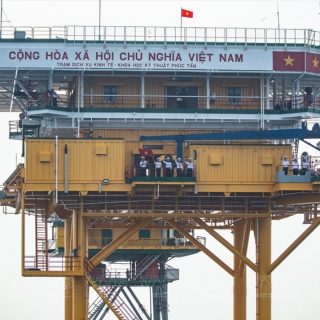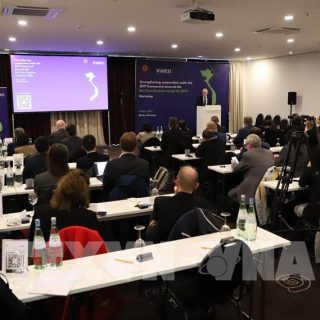The long-standing disputes in the South China Sea over the ownership of its many features, reefs, atolls, and rocks over the last few years have seen tensions rise between China, littoral states as well as external powers such as the US. A total of six parties—China, Taiwan, Vietnam, Malaysia, Brunei, and the Philippines—hold competing territorial and jurisdictional claims over a number of islands, low-tide elevations, rocks, and reefs in the South China Sea. Add to this competing claims over exclusive economic zones (EEZs) and the associated rights to exploit oil and gas reserves and plentiful fishing grounds of the South China Sea, as well as an intense strategic rivalry over regional hegemony by the US and China, and what you have is a protracted, multi-dimensional conflict in a part of the world that, as a mere side note to it all, hosts some of the most important transit routes for global seaborne trade with Asia. EU representatives, as well as representatives of its member states, have repeatedly stated that the EU has a major interest in a stable, peaceful South China Sea. Most of Europe’s trade with Asia transits through the South China Sea. China and the ASEAN states are, respectively, the EU’s second and third largest trading partners. Unlike other external actors like the US or Australia, however, European powers, with the exception of a comparatively small French and British navy presence in the Pacific, lack any significant hard naval power capabilities in the region. EU strategic documents and policy papers have stressed the importance of freedom of navigation in the South China Sea and encouraged the parties to peacefully resolve disputes in accordance with international law, particularly the United Nations (UN) Convention on the Law of the Sea (UNCLOS). The EU has also reiterated its neutrality and has not taken a position on any of the claims to land territory and maritime space in the South China Sea. A view held my many in Southeast Asia was that the EU could and should do more to protect its interest in the South China Sea, and perhaps more importantly, do more to support its partners in the region vis-à-vis an increasingly assertive China. And there were voices inside of Europe, too, that called for an “EU Asia pivot,” including a stronger 152involvement, diplomatically and militarily, in the South China Sea. However, in the context of the award issued by the arbitral tribunal constituted under Annex VII of the UNCLOS and released by the Permanent Court of Arbitration (PCA) in July 2016, herein referred to as the South China Sea Award (in short “SCS Award”), it became apparent that European powers were far from united on such a recalibration of European foreign policy. Quite the contrary, it took the EU three days to come up with a rather weak statement on the award, refraining from even mentioning China, due to resistance by Eastern and Southeastern member states.

Dr Felik Heiduk, German Institute for International and Security Affairs
For more:
https://www.taylorfrancis.com/books/e/9780429331480/chapters/10.4324/9780429331480-11

Aufrufe: 397

 Deutsch
Deutsch Tiếng Việt
Tiếng Việt



